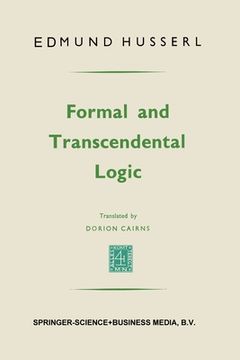Compartir
Formal and transcendental logic (en Inglés)
Edmund Husserl
(Autor)
·
Springer
· Tapa Blanda
Formal and transcendental logic (en Inglés) - Husserl, Edmund
$ 157.28
$ 241.96
Ahorras: $ 84.69
Elige la lista en la que quieres agregar tu producto o crea una nueva lista
✓ Producto agregado correctamente a la lista de deseos.
Ir a Mis Listas
Origen: Estados Unidos
(Costos de importación incluídos en el precio)
Se enviará desde nuestra bodega entre el
Martes 23 de Julio y el
Martes 06 de Agosto.
Lo recibirás en cualquier lugar de Ecuador entre 1 y 3 días hábiles luego del envío.
Reseña del libro "Formal and transcendental logic (en Inglés)"
Preparatory Considerations.- I / The Structures and the Sphere of Objective Formal Logic.- 1. Formal logic as apophantic analytics.- 2. Formal apophantics, formal mathematics.- 3. Theory of deductive systems and theory of multiplicities.- 4. Focusing on objects and focusing on judgments.- 5. Apophantics, as theory of sense, and truthlogic.- II / From Formal to Transcendental Logic.- 1. Psychologism and the laying of a transcendental foundation for logic.- 2. Initial questions of transcendental-logic: problems concerning fundamental concepts.- 3. The idealizing presuppositions of logic and the constitutive criticism of them.- 4. Evidential criticism of logical principles carried back to evidential criticism of experience.- 5. The subjective grounding of logic as a problem belonging to transcendental philosophy.- 6. Transcendental phenomenology and intentional psychology. The problem of transcendental psychologism.- 7. Objective logic and the phenomenology of reason.- Conclusion.- Appendix I / Syntactical Forms and Syntactical Stuffs; Core-Forms and Core-Stuffs.- 1. The articulation of predicative judgments.- 2. Relatedness to subject-matter in judgments.- 3. Pure forms and pure stuffs.- 4. Lower and higher forms. Their sense-relation to one another.- 5. The self-contained functional unity of the self-sufficient apophansis. Division of the combination-forms of wholes into copulatives and conjunctions.- 6. Transition to the broadest categorial sphere.- a. Universality of the combination-forms that we have distinguished.- b. The distinctions connected with articulation can be made throughout the entire categorial sphere.- c. The amplified concept of the categorial proposition contrasted with the concept of the proposition in the old apophantic analytics.- 7. Syntactical forms, syntactical stuffs, syntaxes.- 8. Syntagma and member. Self-sufficient judgments, and likewise judgments in the amplified sense, as syntagmas.- 9. The "judgment-content" as the syntactical stuff of the judgment qua syntagma.- 10. Levels of syntactical forming.- 11. Non-syntactical forms and stuffs - exhibited within the pure syntactical stuffs.- 12. The core-formation, with core-stuff and core-form.- 13. Pre-eminence of the substantival category. Substantivation.- 14. Transition to complications.- 15. The concept of the "term" in traditional formal logic.- Appendix II / The Phenomenological Constitution of the Judgment. Originally Active Judging and Its Secondary Modifications.- 1. Active judging, as generating objects themselves, contrasted with its secondary modifications.- 2. From the general theory of intentionality.- a. Original consciousness and intentional modification. Static intentional explication. Explication of the "meaning" and of the meant "itself." The multiplicity of possible modes of consciousness of the Same.- b. Intentional explication of genesis. The genetic, as well as static, originality of the experiencing manners of givenness. The "primal instituting" of "apperception" with respect to every object-category.- c. The time-form of intentional genesis and the constitution of that form. Retentional modification Sedimentation in the inconspicuous substratum (unconsciousness).- 3. Non-original manners of givenness of the judgment.- a. The retentional form as the intrinsically first form of "secondary sensuousness". The livingly changing constitution of a many-membered judgment.- b. Passive recollection and its constitutional effect for the judgment as an abiding unity.- c. The emergence of something that comes to mind apperceptionally is analogous to something coming to mind after the fashion of passive recollection.- 4. The essential possibilities of activating passive manners of givenness.- 5. The fundamental types of originally generative judging and of any judging whatever.- 6. Indistinct verbal judging and its function.- 7. The superiority of retentional and recollectiona
- 0% (0)
- 0% (0)
- 0% (0)
- 0% (0)
- 0% (0)
Todos los libros de nuestro catálogo son Originales.
El libro está escrito en Inglés.
La encuadernación de esta edición es Tapa Blanda.
✓ Producto agregado correctamente al carro, Ir a Pagar.

